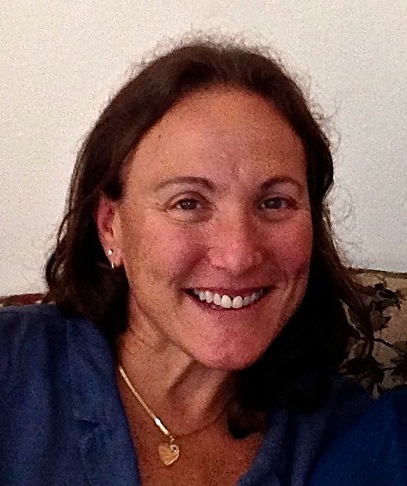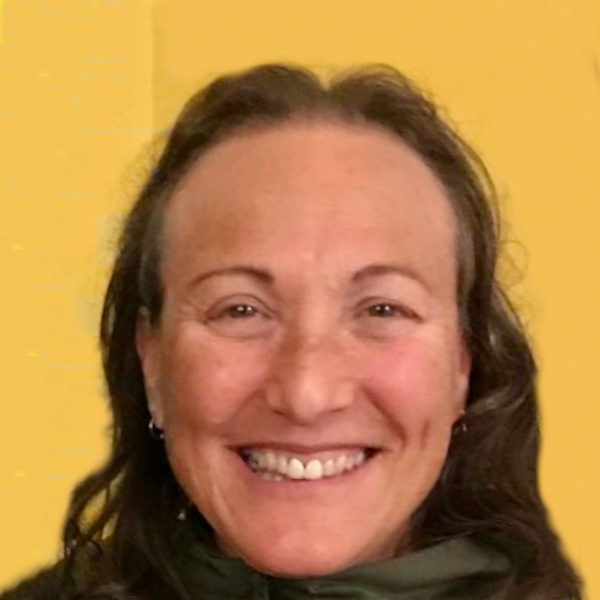Interviews with Olim
Each month, we interview an oleh or olah for our newsletter.
We invite you to read the stories of LGBTQ+ people who have made Israel their home.
"As a committed Jew and ordained rabbi, Israel and Judaism have always been a huge part of my life"
Interview date: February 2015.
Updated: August 2022. Scroll down for update.
Q. Where were you born and where did you grow up?
A. Ha! Not sure I ever did grow up! I was born on Long Island in New York in November of 1963. We moved to Israel for a couple of years when I was seven and then back to the US. I finished grammar and high school in Brookline (Boston), Massachusetts. I did most of my growing up when I moved to Northern California (in my late teens) where I first studied music at university. California really was MY place. Lots of natural bodies of water and lots of mountains and trees. Lots of openness and diversity. A lot of explorations in diverse traditions and spirituality. Lots of hallucinogens (but I didn’t inhale)!
Q. At what age did you come out? And how did it go?
A. I identify as a lesbian and as queer (especially when, on rare occasions, I put on lipstick and my alter-ego drag queen self pops out). I messed around with my best girlfriend when I was a senior in high school and had my first serious boyfriend the summer before I started college. I didn’t have a real girlfriend until I turned 30. She was eight years younger than me. A few years earlier, I came out to my mom on the beach in Tel Aviv. I think I came out to her as ‘bi’ and she said that if she had been born in a different generation she might have identified similarly. My dad always makes good connections with my girlfriends. I think he admires self-made women – ones who live life on their own terms.
Coming out is not something you do once but all the time. I’ve been coming out my entire life and I still come out every day. I come out to myself and I look for occasions to come out to others everyday like weaving it into conversations when meeting people for the first time. It gets the issue front and center, from the get-go, so people know who I am and where I stand. Coming out is about self-acceptance, of claiming my right to be who I am and to exist in this world. It’s about owning my power and honoring all the colors I bring to the big rainbow of life.
Q. Were you involved at all in the LGBT community back home?
A. I was completely out, had lots and lots of LGBT friends and was somewhat involved in the Queer political community in the San Francisco Bay Area. I was very involved in the campaign for marriage equality and had lots of queer Israeli friends and associates who worked for the Israel Education Center and the greater Jewish community. I spoke on a panel at the San Francisco Jewish Film Festival when they premiered Nitzan Gilady’s Jerusalem is Proud to Present which is about the World Pride March in 2006 in Jerusalem (and the stabbing by the Haredi man). It’s much more normal to be queer in the SF-Bay than a lot of other places though it’s not necessarily universally accepted. Starting in the late 1980s I worked in a congregation that was very welcoming of LGBT members and had a large number of lesbian couples and families. I attended the first Dyke March in San Francisco in June of 1993 and most of the Gay Pride marches over the years. The last Pride March I attended in San Francisco was the day before I made Aliyah. I marched on the float of the Israeli consulate with Akiva Tor, our very straight married Orthodox Consul General who wore a lavender feather boa specially for occasion, and the shlicha who processed my Aliyah paperwork.
Q. How long since you made Aliyah?
A. I officially made Aliyah in June, 2012.
Q. Why did you make Aliyah?
A. Although I grew up as a Zionist, by the time I moved here my politics and relationship with Israel had changed many times. As a committed Jew and ordained rabbi, Israel and Judaism have always been a huge part of my life. Plus everyone in my immediately family has Israeli citizenship and I was the last to make Aliyah. I worked in the North American Jewish community for more than half my life and I was at a transition point in my life. It seemed like the most natural thing to do.
Q. Did you move here on your own or with family/friends/significant other?
A. I moved here on my own and my first home was with my younger sister and her family on Kibbutz Revadim. She made Aliyah more than 25 years ago and married a kibbutznik. My older sister made Aliyah more than 36 years ago and lives with her Sabra husband in Yavne. They are my only siblings and between the two of them I have five amazing nieces and nephews aged 16-26.
Q. How is it going so far?
A. It’s been crazy, amazing, difficult, wonderful, exciting and painful. I’ve made three major moves in less than three years and am now beginning to feel more settled. I’ve made some nice personal connections and I worked for a while at a job that wasn’t right. I do a lot of exciting things and am NEVER bored but I still haven’t quite figured out how to make a sustainable living here. Any ideas?
Q. What do you think about the Israeli LGBT community so far?
A. It’s very diverse! I really want to thank Roy for asking me to help him nudge the Jewish Agency into the realization that there are quite a few LGBT Olim who need and deserve their own unique welcome. I know LGBT folk in all walks of life here – from closeted religious folks to the most secular, including those who barely speak any English. I REALLY wanted to take the training for the Speakers Bureau at Hoshen (my favorite LGBT Israeli organization who educate for change in the government and private sectors) but I’ve found it totally impossible to break in. That’s been frustrating.
Q. If you could choose anyone, who would you pick as your mentor?
A. I’ve had many mentors throughout my life who have helped me through various challenges and helped me reach my goals. But I also have peers and colleagues whom I admire because they are models of happiness and success. But I don’t have one desired mentor or rebbe.
Q. If you could learn to do anything, what would it be?
A. Some things I’d love to learn to do are: fixing bicycles, studio recording, studying Arabic and Japanese, whole foods cooking and fermenting, playing the double bass and tablas.
Q. If you could be any fictional character, who would you choose?
A.I suppose it would be Xena the Princess Warrior because she is so hot but I can’t recall every sitting through an entire episode.
Q. Any plans or dreams for the future?
A. Whirled Peas, of course! And to continue to sing with lots of amazing accompanists and bands and always have gigs on my calendar; to grow an amazing organic garden; to travel to New Zealand and India and Japan and Iceland and Spain; to open a Pilates studio and work with people who want to get fit and happy. I am actually a Wingate Institute certified instructor and am starting a business in one-on-one fitness training for adults in mid-life. I am also about to launch a new website, Destination Celebrations, so I can more widely offer my rabbinic knowledge and cantorial talent to create the perfect and most inspiring life cycle events for individuals, couples and families here and abroad.
Rosalind

Our Newsletter
Sign up if you would like to receive a monthly email listing events of interest to LGBT English-speakers in Israel, an interview with an oleh/olah and other useful information.
Want to be interviewed?
Complete the form below and we will get back to you.
"I can support Israel better as a citizen than I could as a Jew and rabbi living abroad"
Interview date: August 2022
Q. Has your life changed since we last interviewed you? If so, how?
A. Life’s changed a ton since 2015 (and since my Aliyah in 2012)! I can hardly believe it’s been 10 years since my Aliyah. Both my mom and dad died (in 2018 and 2021 respectively) in the USA and being here made it extra hard. I stopped gigging with ShiRaz as my guitarist Sharon could not settle in with her own Aliyah and returned to New York state. My last guitarist, Chris, left me for his trumpet during Covid. Hey, do you know any super stellar accompanists who might want to play for this awesome singer?!?! I also worked as a High Holiday Rabbi in Honolulu for Sof Ma’arav for five years. This year am taking a new High Holiday position in New Jersey.
Q. Are you still living in the same town/city to which you made aliyah? Or have you moved around?
A. When I made Aliyah I lived with my sister on kibbutz and then moved to Florentin in Tel Aviv for the summer. When I got a job offer to work with Rabbinical students I moved to Jerusalem. I only lasted in that job for six months but I made a solid landing and have stayed! I’m still in my rented apartment in the German Colony (nine years now!), the longest I’ve lived anywhere since childhood. This city is so walkable! But I do miss the beach A WHOLE LOT.
Q. Are you working in your desired industry/area? Do you have any advice on job hunting, job applications and interviews?
A. I moved to Israel to be closer to my sisters (who moved here decades ago) and my five sabra nieces/nephews. I made Aliyah single at age 48 and with no kids and I am still waiting for my besherte (if you’re out there, LOL)! Seven years ago I created Joyful Jerusalem Lifecycles, mostly leading Bat and Bar Mitzvah events and destination weddings. It was really successful before Covid and then things dried up. But with travel, lots of work is returning again. Entrepreneurs in this start-up nation don’t need to worry about job connected health insurance (like in the US), so it’s much easier to work independently for myself. I also get work as a Rabbi again, which I never thought would be possible in Israel. It really is true that the Israeli job market is seriously ageist, so creating my own business was a perfect workaround.
Q. How is your Ivrit now? What sites or apps would you recommend that helped you?
A. My Hebrew has been good since living in Israel with my family as a child but there are still some gaping holes. I don’t read books or newspapers or write extensively in Hebrew but I listen to podcasts and understand the news and am part of a Hebrew-speaking community. You do have to work hard to integrate in Israel because it’s comfortable to hang out in a bubble with other English-speakers. It is not only about the language but shared values and culture. So you need to be able to stretch and grow to find your place. Moving to Israel from an English-speaking country means leaving your comfort zone. Most Israeli families originated somewhere else, and we assimilate to different degrees. Aliyah, like any major change in life, is easier when you’re younger. And klitah (absorption) is also easier when you’re partnered with an Israeli, like both of my brothers-in-law who are sabras.
Q. Have you discovered any off-the-beaten-track locations that you’d recommend to others?
A. I love that organic farming has taken root in Israel and am grateful for the CSAs (Community Supported Agriculture) delivery programs and weekly markets available in more communities in Israel. Organic produce is essential since Israeli produce has an extremely high level of pesticides and these are not well regulated here. All the organic farms have visitor days during Sukkot and Pesach which I highly recommend. I’m a swimmer, and having a pool is important especially in summer (and you should go during off-hours as they get very crowded). Cars are expensive in Israel so fortunately there is decent public transit. But roads are crowded and getting ANYWHERE takes a loooong time. Hence, I travel more abroad than I do in Israel. If you are young and fit, hiking the Israel trail is awesome. There is an incredible English- friendly app to explore called Jerusalem by Oren and his Traveling Israel website has a wealth of informative videos and endless valuable tips and knowledge.
Q. Are there any other groups or activities that you found that helped you integrate more into Israeli society?
A. Other than my amazing social justice oriented and musically gorgeous shul in Jerusalem, Kehilat Zion, led by Rabbah Tamar Elad Appelbaum (YouTube).
Two civil society organizations that really matter to me are Tag Meir and the Jerusalem Open House for Pride and Tolerance, serving our LGBT community in essential and supportive ways and sponsors our critically essential Pride March every year!
Q. Do you feel that living in Israel has changed you? If so, how?
A. Having moved to Israel I appreciate the country much much more than I did before. The sheer diversity and complexity of Jewish and Israeli identity is visibly apparent here in a way that it is not abroad, and I have a healthier perspective on the difficulty and challenge of building and sustaining a Jewish country that needs to do right by all its citizens and residents. Our ambassadors and state department do an enormous amount of social justice work abroad. Yet this is not widely known, advertised, or appreciated because many countries do not wish to publicize their alliances with Israel. While I don’t like what the occupation does to Israel’s moral core, I value this young project of a Jewish nation and I can support Israel better as a citizen than I could as a Jew and rabbi living abroad.
Q. Do you have any practical advice for new olim/olot or anyone who’s considering making aliyah?
A. Israel is small, crowded, expensive, hot and complicated. Come prepared to be challenged. Be adventurous. Open your mind. Develop a thick skin. Don’t give up!
Rosalind

Our Newsletter
Sign up if you would like to receive a monthly email listing events of interest to LGBT English-speakers in Israel, an interview with an oleh/olah and other useful information.
Want to be interviewed?
Complete the form below and we will get back to you.


